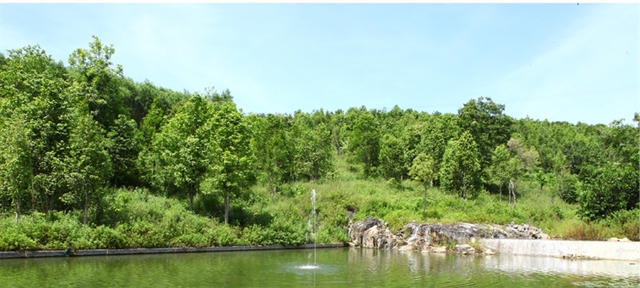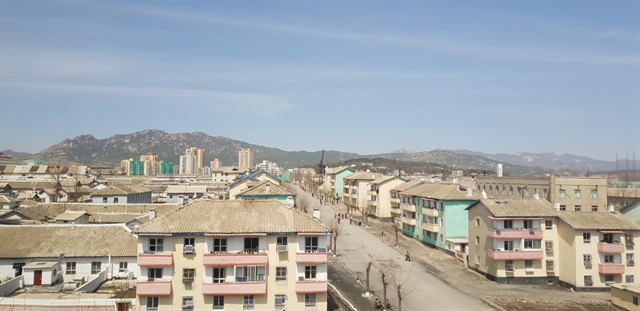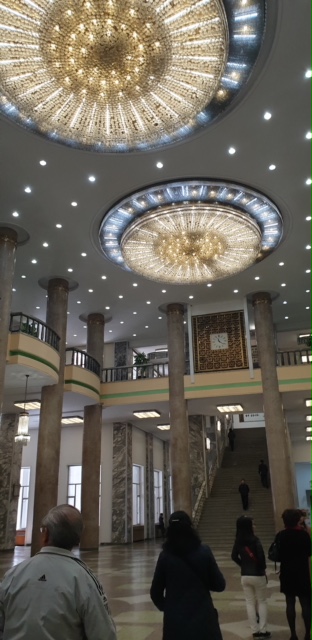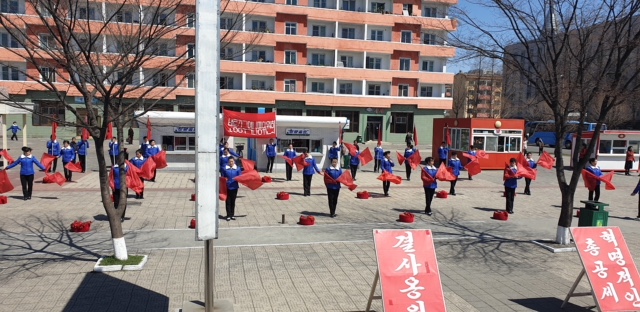 Sunday/Weekend
Sunday/Weekend


|
| Living quarters have been well planned but lack the electricity, water and finishing touches. — VNS Photo Lê Hoa |
By Vũ Lê Hoa
As an avid traveller, I have set myself a target of visiting 100 countries around the world. North Korea stands at 67, so I’m two thirds there. On my list, I visited Latvia in the Baltics the year before, and last year I went to Mongolia. So this year, when a new tour to North Korea was announced after the unsuccessful Trump-Kim summit in Hà Nội, I boarded the first tour heading to Pyongyang.
At 3am, we arrived at the airport. I had expected two groups of people on my tour: a group of wealthy elderly people visiting North Korea out of curiosity, and maybe younger people in their 30s or 40s who were single and wanted to tick off one more destination on their bucket lists.
We flew from Hà Nội to Beijing, then Pyongyang, a secretive city hidden away from most people. From Beijing there are only three charter flights to Pyongyang every week, so you cannot just book a flight and go on your own, you have to book a tour or be invited by a host in North Korea.
I saw a group of Chinese tourists, another from South Korea and Singapore. We were told not to take pictures. At the airport, our baggage was checked carefully, but when we said we were from Việt Nam, the customs officers smiled.
Our tour guides were two young North Korean women who spoke really good English and Chinese. They were both from well-educated families: one had a father who was an ambassador, and the other a college professor.

|
| Pyongyang is well planned with a metro system with ornate stations. — VNS Photo Lê Hoa |
The road from the airport to city was wide and had a bicycle lane, but it was still old and bumpy. Along the road, we saw people travelling by bicycle or on foot. We saw large fields fresh from the winter harvest, and sakura trees were in full bloom.
When we arrived in the city, my first reaction was: damn the media, everything I'd been led to believe was wrong.
What we saw with our own eyes was a big city, well-planned with big roads. It was so clean, even cleaner than Japan! It was spotless.
It was good that we went on a Saturday, so we were able to witness the Saturday for Public Good: every citizen in the country was out on the streets picking up grass and garbage.
There were many cars in the city, which also has a metro system, a public bus system and an electric bus service. The metro station is as elaborate and beautiful as those in Russia.
The buildings seem to be a throwback to the 1970s-80s style and looked grandiose, just like those in Russia. But they do not have supermarkets, cafes, flickering lights or fashion houses. Urban planning was good in general. Housing and office buildings were well planned, but the construction quality was poor and the finishing details were unrefined.
We were free to take pictures of everything we saw, but not allowed to capture vulgar acts against their leaders. We were not allowed to take pictures of unfinished construction nor stray further than 10m from our pretty tour-security guide.

|
| North Korean students during a PE class. — VNS Photo Lê Hoa |
Well planned city, but no electricity nor water
I thought North Koreans were malnourished. Everyone was thin. I guessed they were getting shorter due to lack of milk. The men looked stern. Everyone was wearing the same simple clothes, just like the Chinese people in smaller provinces in the 1990s. Everyone had the same haircut and no dye. Everyone was wearing a badge. When talking about their leader, their eyes beamed with respect and pride.
Then we were taken to a hotel, about 4-star, I think. It had a casino and wifi for tourists. Over five days, I did not know what was happening outside of our group. But we had time to read, take pictures and think over the society we were seeing. It was not as threatening as I had expected.
I came to understand why North Koreans focus on their studies, play sports, do manual work in a group or sing and dance, also in a group. The simple reason is they are not glued to their mobile phones.
The only negative thing was because the hotel was located on an island in the middle of a river, we couldn’t go anywhere. It seemed to me that all tour groups were sent to this hotel. It was easy to supervise. Even in the city, it was hard to go out at night. Pyongyang turns pitch black at night, with no recreational centres. People also try not to use too much electricity. Oh, one more thing: water is scarce.
The national television has two channels, but just one main character. You know who!
The food we had was delicious. The restaurant only served tourists, and only the staff were local.
The next day we had a city tour. Pyongyang was nice with many big buildings. They showed us a spirit of clean and poor yet proud with a special height of nationalism. We visited a monument and laid wreaths to the presidents. Couples and school children also go there to pay tribute to the grandiose statues on top of a mountain.
A subsidised life
On the way, we were briefed that everyone is provided the following: electricity, water, rice and meat. Everyone is entitled to 30 square metres of housing, so a family of four gets a 120 sq.m apartment. Everyone gets rice, vegetables and meat weighing 200g. That explained how slender and thin they were.
On our way from north to south, it took us three hours to travel 160km. I counted 20 ploughs but no trucks. Everything else was done by manual labour. There were some buffalos, but they were super skinny. Farm planning was simple: all I could see was just rice fields and apple trees.
The real war with the United States and South Korea officially lasted for only one year. The rest has been a ceasefire. But their anti-American attitude is strong. Their painting at the war museum was magnificent, Soviet style, of course. 40 artists painted 10,000 people in 15 years! Picture perfect!
Juche Tower
I thought North Korea had adopted the ideology of Communism, following Karl Marx and Lenin, but I was wrong.
The Juche Tower, or the Tower of the Juche ideology (meaning you are the subject of your life) stands on the east bank of the Taedon River and was erected to commemorate President Kim il-sung’s 70th birthday.
The 600-reading-room library was built in only nine months. They still use cassette recorders. In the library, I found four books in Vietnamese, two of which were written by my mother’s colleagues at the Hà Nội University of Technology. The price on the book reads VNĐ1.9 (Now the minimal notes are VNĐ200 and VNĐ500, but you can never find them in circulation. The smallest note in use is VNĐ1,000!)
We were not allowed to make contact with local people. We asked if we could go to the local market, but our request was denied. The electronics shop I was lucky enough to have strayed into had Chinese goods. There were not many to choose from. It reminded me of the Giảng Võ Duty Free Shops in Hà Nội in the 1980s. They only accepted US dollars and Chinese yuan.
I was happy to find a shop for local people: Mini So. But it also belongs to the state. Every property in North Korea belongs to the state: cars, taxis, shops, hotels. When you have your own wedding, you have to pay $3 per guest, but you can borrow a car for the bride and groom and the wedding hall from your employer. A new bed costs $70, while the average monthly salary is $100.
I got the impression that if North Korea opens up, it could leap past Việt Nam because they already have good infrastructure, discipline, patriotism and above all, they are very smart and well-educated. A librarian we met spoke four languages although they did not have native speaking teachers.
But if North Korea opens up, we will lose a peaceful country, that’s for sure. They may be hungry and stripped off a certain degree of freedom, but they are somehow happy. They have almost everything they could want for.
I had expectations and surprises. I was disappointed and delighted. I could not get to see what I set out to see: I wanted to feel again the austere scene of the subsidised period in Việt Nam I grew up in, but I did not feel it.
But one thing is for sure, this was a once-in-a-lifetime experience, and I will not go back. VNS




